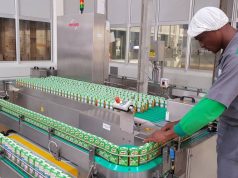Femi Otedola, billionaire businessman and chairman of Geregu Power Plc, has expressed strong support for Aliko Dangote, founder and president/chief executive of the Dangote Group, in his dispute with the Depot and Petroleum Products Marketers Association of Nigeria (DAPPMAN).
Mr Otedola in a statement on Sunday, congratulated Mr Dangote on the success of his refinery, describing it as a “historic leap for Nigeria’s energy independence and economic future.”
He praised President Bola Tinubu for executing the full deregulation of the downstream petroleum sector, saying it has “broken the grip of entrenched interests and ushered in a new era of transparency, healthy competition, and customer-centric service delivery.”
Mr Otedola criticised DAPPMAN, a group he said he founded in 2002, for resisting change and clinging to outdated business models built on fuel imports and subsidy exploitation.
“In a sector long plagued by rent-seeking, subsidy fraud, product diversion, and smuggling, this reform marks a decisive break from the past and lays the foundation for a more efficient and accountable energy market.
“Voices determined to resist change, even when it’s clear the tide has turned. You can delay change, frustrate it, even sabotage it but you can never stop it.
“I founded DAPPMAN in 2002 (23 years ago) with a clear mission, to challenge the dominance of the major marketers and give independent depot owners a fair platform to thrive. I personally structured the group, appointing the late George Enenmoh, then MD of Ascon Oil, as Chairman, while I served as Vice Chairman and Sayyu Dantata as Secretary.
“At the time, depot ownership was strategic. We were filling critical supply gaps left by an inefficient system. But times have changed. Many of the original players have exited the scene, and those left are clinging to assets that no longer reflect today’s business realities,” Mr Otedola said.
He said he advised some DAPPMAN members last year to sell their depots as scrap while they still had value to adapt to the new reality of local fuel production.
“Nigeria now has over 4 million metric tons of storage capacity, most of it idle. With the Dangote Refinery now supplying fuel locally, the old business model is crumbling,” he said.
According to him, Zenon Oil pioneered the modern diesel business in Nigeria and grew to become the largest supplier in the country.
“We built depots to store our imported diesel because the market was import-driven and riddled with inefficiencies. But with Dangote’s refinery fully operational, those gaps no longer exist. We now have domestic production and local supply efficient, reliable, and proudly Nigerian,” he added.
Mr Otedola highlighted the benefits of the Dangote Refinery, including eliminating gridlock around the Ibafon, Tincan and Apapa areas and elevating the entire logistics chain with the purchase of 8,000 brand new CNG eco-friendly trucks.
As the founder of DAPPMAN, Mr Otedola said he knows the business intimately and has deep experience in the industry, adding that the setting up of depots was mainly to collect Petroleum Fund Incentives (PFIs) and that the era of subsidy exploitation is fast disappearing.
“What is DAPPMAN fighting for today? To preserve a model built on fuel imports, subsidy exploitation, and outdated infrastructure? That era is fast disappearing. The setting up of depots was mainly to collect PFIs.
“No depots, No PFIs from NNPC who were sole suppliers of gasoline at the time and which thus led to the breeding of complacent importers whose sole agenda was on arbitrage and subsidy margins.
“Since PFI is gone, I see no reason why Dangote Refinery should subsidise DAPPMAN with N1.5 trillion which they are asking Dangote Refinery to pay and subsequently pass this cost to consumers,” Mr Otedola said.
He advised DAPPMAN members to focus on owning and scaling last-mile retail outlets, rather than holding on to tanks built for a fuel import economy that no longer serves the country.
He noted that depots do not drive employment as some claim, adding that a typical depot employs perhaps five people, gatekeeper included.
In contrast, he said a single filling station can provide jobs to dozens of Nigerians from pump attendants to cashiers, security personnel, and cleaners.
If anything, he said “DAPPMAN members should be focusing on owning and scaling last-mile retail outlets, not holding on to tanks built for a fuel import economy that no longer serves us.
“The global picture is instructive. Depots in Amsterdam or Houston were designed to serve export markets, especially Africa. With Nigeria now refining locally, such infrastructure is increasingly unnecessary. If DAPPMAN members do not adapt, they will not only become irrelevant, they may go bankrupt,” he added.
Mr Otedola said DAPPMAN should consider selling, restructuring, or investing in new value chains, adding that if they truly believe in competition, they could even come together and acquire the Port Harcourt Refinery and see if they can succeed where the Nigerian National Petroleum Company Limited (NNPC Ltd) could not.
Mr Otedola said Dangote refinery is not the problem, but the solution. He praised Dangote’s courage in bringing about transformative change in the downstream sector and encouraged him to continue his work.
“DAPPMAN had its place but today, its relevance is fast fading. We must stop clinging to outdated privileges and focus on a new era built on self-sufficiency, transparency, and sustainable value creation. Aliko’s refinery is not the problem. It is the solution,” he said.
Dangote vs DAPPMAN
In recent days, Dangote Refinery and DAPPMAN have been locked in a heated dispute over the refinery’s operations and pricing strategy.
The refinery’s pricing strategy has been criticised by DAPPMAN, with the association accusing the refinery of offering lower prices to international buyers while quoting higher rates to local off-takers.
In its response last Monday, Dangote Refinery in an advertorial piece signed by its management, accused DAPPMAN of attempting to sabotage its efforts to boost Nigeria’s energy self-sufficiency.
The refinery also accused DAPPMAN of engaging in “round-tripping,” where petrol produced by the refinery is re-imported from Togo into Nigeria at a markup. The refinery also claimed that DAPPMAN’s members are exploiting arbitrage opportunities by diverting products to more lucrative markets in the sub-region.
Last Wednesday, DAPPMAN denied these allegations and threatened to take legal action if the refinery does not retract its claims. The association argued that the refinery’s actions are aimed at monopolising the market and undermining competition.
“We challenge the Dangote refinery to present verifiable evidence that DAPPMAN members are diverting products to neighbouring countries. Smuggling is a national security matter. If any member is complicit, let the relevant agencies act. Otherwise, this allegation must be retracted within seven days, or we reserve the right to seek legal redress,” the association said in a statement.
But in its response, Dangote Refinery emphasised that any party who feels aggrieved by the contents of its publication is entitled to seek redress through the appropriate legal channels, without recourse to any so-called seven-day notice.
“We are fully prepared to defend our position,” it said.
Last Thursday, the company added that the ongoing dispute with the DAPPMAN stems over the latter’s demand for an annual subsidy of N1.505 trillion to enable members to match the refinery’s gantry prices at their own depots.
It alleged the association is demanding a subsidy to cover additional logistics costs tied to transporting products from the refinery to their depots via coastal logistics, which would add N75 per litre to fuel costs.
The refinery added that the association effectively asked it to absorb the cost or pass it on to consumers.
BELOW IS THE FULL STATEMENT BY FEMI OTEDOLA
Congratulations to my dear brother, Aliko Dangote, on the success achieved so far since the Dangote Refinery commenced operations. It is a historic leap for Nigeria’s energy independence and economic future.
But more importantly, credit must go to President Bola Ahmed Tinubu for doing what no other leader before him had the political will to execute, the full deregulation of the downstream petroleum sector. This singular act has broken the grip of entrenched interests and ushered in a new era of transparency, healthy competition, and customer-centric service delivery. In a sector long plagued by rent-seeking, subsidy fraud, product diversion, and smuggling, this reform marks a decisive break from the past and lays the foundation for a more efficient and accountable energy market.
Yet despite this progress, there are still voices clinging to the old ways. Voices determined to resist change, even when it’s clear the tide has turned.
I’ve followed recent commentary around fuel supply issues and feel compelled to provide some perspective, especially as it relates to the future of this country, which remains threatened by entrenched cabals who still believe they can block the winds of reform.
But history has shown time and again: you can delay change, frustrate it, even sabotage it but you can never stop it. I founded DAPPMAN in 2002 (23 years ago) with a clear mission, to challenge the dominance of the major marketers and give independent depot owners a fair platform to thrive.
I personally structured the group, appointing the late George Enenmoh, then MD of Ascon Oil, as Chairman, while I served as Vice Chairman and Sayyu Dantata as Secretary. At the time, depot ownership was strategic. We were filling critical supply gaps left by an inefficient system.
But times have changed. Many of the original players have exited the scene, and those left are clinging to assets that no longer reflect today’s business realities . I advised some of them as far back as last year to sell their depots as scrap while they still had value. Nigeria now has over 4 million metric tons of storage capacity, most of it idle. With the Dangote Refinery now supplying fuel locally, the old business model is crumbling.
ALSO READ: Femi Otedola’s memoir details billionaire’s N11.57 billion donations
Zenon Oil pioneered the modern diesel business in Nigeria and grew to become the largest supplier in the country. We built depots to store our imported diesel because the market was import-driven and riddled with inefficiencies. But with Dangote’s refinery fully operational, those gaps no longer exist. We now have domestic production and local supply efficient, reliable, and proudly Nigerian. Furthermore, we must not fail to recognise the attendant benefits of eliminating the grid lock around the Ibafon , Tincan and Apapa areas due to the operations of the Dangote Refinery.
More than just producing fuel, Aliko has elevated the entire logistics chain. He has purchased 8,000 brand new CNG eco-friendly trucks that will distribute across the country with less pollution and fewer breakdowns, unlike the aging, rickety trucks still used by some operators. I know this business intimately. I was king of it and at the peak of it in 2005 (20 years ago) , I was conferred with the life patron of the PTD union by Mr Akinlaja. So, when I say the game has changed, I speak from deep experience.
What is DAPPMAN fighting for today? To preserve a model built on fuel imports, subsidy exploitation, and outdated infrastructure? That era is fast disappearing. The setting up of depots was mainly to collect PFIs. No depots, No PFIs from NNPC who were sole suppliers of gasoline at the time and which thus led to the breeding of complacent importers whose sole agenda was on arbitrage and subsidy margins. Since PFI is gone, I see no reason why Dangote Refinery should subsidize DAPPMAN with N1.5 trillion which they are asking Dangote Refinery to pay and subsequently pass this cost to consumers. I salute the courage of my brother Aliko Dangote, like Amazon Incorporated in bringing about transformative change in the downstream sector.
On subsidy, I personally warned President Goodluck Jonathan that he was being misled. The system was built to benefit depot owners, and DAPPMAN members became the primary beneficiaries. Over ₦2 trillion was siphoned through questionable claims, all tied to depot licenses. The policy rewarded neither transparency nor innovation, it encouraged rent-seeking and corruption.
Let’s also address a myth that continues to be repeated. Depots do not drive employment as some claim. A typical depot employs perhaps five people, gatekeeper included. In contrast, a single filling station can provide jobs to dozens of Nigerians—from pump attendants to cashiers, security personnel, and cleaners.
If anything, DAPPMAN members should be focusing on owning and scaling last-mile retail outlets, not holding on to tanks built for a fuel import economy that no longer serves us.
The global picture is instructive. Depots in Amsterdam or Houston were designed to serve export markets, especially Africa. With Nigeria now refining locally, such infrastructure is increasingly unnecessary. The same thing happened in the cement industry. Once Nigeria started producing cement locally, the bulk carriers that used to dock at our ports were retired, many sold as scrap. The same outcome awaits fuel depots.
If DAPPMAN members do not adapt, they will not only become irrelevant, they may go bankrupt. Instead of resisting progress, they should consider selling, restructuring, or investing in new value chains. In fact, if they truly believe in competition, they could even come together and acquire the Port Harcourt Refinery and see if they can succeed where NNPC could not.
Even in developed markets, refinery operators are downsizing their depot footprint. Many are converting them into bonded warehouses or exiting completely. Folawiyo Group, known for its foresight and integrity, sold its depot and exited early. That is strategic thinking.
DAPPMAN had its place but today, its relevance is fast fading. We must stop clinging to outdated privileges and focus on a new era built on self-sufficiency, transparency, and sustainable value creation.
Aliko’s refinery is not the problem. It is the solution.
Let’s move forward.
Africans are proud of you. And yes, my dear brother Aliko, you can now go to Monaco and rest jejely like me. You’ve earned it.










